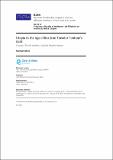Utopia in the age of Realism : Theodor Fontane's Quitt
Abstract
The principal argument of this essay is that Theodor Fontane’s Quitt (1890) can be read as a critical engagement with utopianism. Quitt has previously been analysed as a utopian novel in a narrow sense, specifically because of the Mennonite community in America in which the second half of the novel is set. This analysis is unsatisfactory, however, because it ignores other, associated facets of utopian ways of thinking which permeate the novel, from imagining a happier elsewhere, to political ideologies, to ideals of human conduct. This essay proposes an interpretation of the novel in which ideals of various kinds function within the perception of reality, but can also be morally dangerous when they lead human beings away from a positive engagement with the reality in which they find themselves.
Citation
White , M J 2018 , ' Utopia in the age of Realism : Theodor Fontane's Quitt ' , ILCEA: Revue de l'Institut des langues et cultures d'Europe, Amérique, Afrique, Asie et Australie (Universite de Grenoble) , vol. 30 , pp. 1-15 . https://doi.org/10.4000/ilcea.4499
Publication
ILCEA: Revue de l'Institut des langues et cultures d'Europe, Amérique, Afrique, Asie et Australie (Universite de Grenoble)
Status
Non peer reviewed
ISSN
1639-6073Type
Journal article
Rights
© 2018 ILCEA. This article is published in an Open Access journal. This is the final published version of the work, which was originally published at http://journals.openedition.org/ilcea/4499
Description
ISBN: 9782377470334Collections
Items in the St Andrews Research Repository are protected by copyright, with all rights reserved, unless otherwise indicated.

